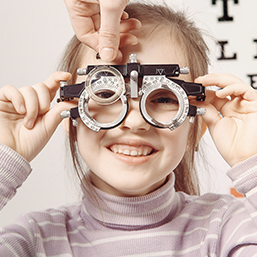
When most people think of vision, they picture an eye chart and 20/20 eyesight. But true vision goes beyond clarity – it's a complex system involving how the eyes move, focus, work together, and how the brain processes what’s seen. If any of these visual skills are underdeveloped, it can impact a child’s learning, sports performance, and confidence.
\n \nAt Eyedeology, our vision therapy programs are designed to strengthen the essential visual skills needed for academic and athletic success.
\nWhy Vision Matters for Learning
\nEighty percent of classroom learning is done visually. Skills like reading, writing, paying attention, and copying from the board relies on how well a child’s eyes coordinate and communicate with the brain. Some kids may struggle with these tasks even if they have 20/20 vision.
\nCommon vision issues affecting learning and sports include:
\nConvergence Insufficiency: Difficulty keeping both eyes aligned when focusing on near tasks. This can cause headaches, eye strain, and reduced concentration during reading or homework. In sports, it may affect depth perception and accuracy, making it harder to catch a ball, judge distances, or aim precisely.
\nAccommodative Dysfunction: Trouble shifting focus quickly between near and far. This can lead to blurry or double vision, making it hard to follow a fast-moving ball or respond quickly in a game.
\nTracking Issues: Poor eye movement control can cause kids to lose their place while reading, skip words, or struggle to copy from the board. On the field, this affects the ability to track a ball, visually follow an opponent, or coordinate body movements with what the eyes sees.
\nThese difficulties can make visual activities tiring, reduce focus, and cause frustration or ultimately avoidance of schoolwork and sports. These problems are not due to lack of intelligence or effort but many children internalize that belief, impacting their confidence and self-worth. It is important to recognize these types of visual deficiencies often require more than just glasses or contact lenses to improve.
\nHow Vision Therapy Helps with Learning and Sports Performance
\nOptometric vision therapy is a personalized, optometrist-guided program that strengthens skills like eye tracking, focusing, teaming, and visual processing. Through fun, interactive activities, skilled optometrists retrain the visual system to work more efficiently.
\nHow Vision Therapy Helps Athletes
\nAthletes rely on quick judgment of speed, distance, and position, which requires strong visual skills such as depth perception, hand-eye coordination, peripheral awareness, and visual reaction time. Vision therapy strengthens the eye-body-brain connection and gives young athletes a competitive edge.
\nSupporting Calgary Kids’ Visual Health
\nAs your child gears up for a new school year or sports season, it’s important to ensure their visual system is ready. A comprehensive eye exam, combined with a binocular vision assessment, can identify visual problems before they impact learning or athletic performance.
\nHow to promote healthy visual development at home:
\nCalgary’s parks and sports programs offer great opportunities to build visual-motor skills naturally through play and movement.
\nIf your child avoids reading, complains of headaches, or struggles in school or sports despite trying hard, along with a comprehensive eye exam, a binocular vision and learning assessment may be the missing piece. Vision therapy also helps with amblyopia (lazy eye), strabismus (eye turn), concussion recovery, and sports performance.
\nWe’ve seen firsthand how vision therapy can reignite a child’s love for learning, boost academic achievement, and restore confidence in sports. When visual skills improve, everything else follows.
\n\n
To learn more visit eyedeology.ca or schedule an assessment call 587-353-5061 or email
\n
See our related articles:
\nCalgary’s Child Magazine © 2025 Calgary’s Child